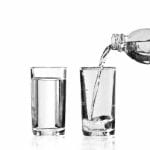Standing water, an abundance of groundwater and even rainwater collection can all become health risks for Colorado Springs and surround area residents. Many are turning to bottled water or water purification systems to guarantee that their water is safe to drink.
This claim is especially true as it pertains to tap water, specifically if your home’s water comes from a well. Excessive rain water in the soil can cause leaks, and there’s always a chance of a high level of minerals seeping into the water through any damage done to the well from the water.
Typically, the deeper a well is, the higher the quality of water, however with so much moisture and water in the area, the water quality can be affected and contaminated.
According to the Center for Disease Control and Prevention, EPA regulations used for public drinking water systems aren’t applied to privately owned wells, so owners of the wells are solely responsible for ensuring their water is safe and has not been contaminated.
The excessive rain gives reason for well owners to pay more attention to his or her tap water, but even if your water is provided by the city, if you have reason to believe it may be contaminated, testing the water on your own is a good idea to keep your family hydrated and healthy.
Noticeable odors, visual discrepancies in the water and even strange tastes are all causes for concern. If there is an issue with your tap water, the city may not realize it before the water gets to your house, or the contamination could take place in the pipes rather than at the water treatment facility.
Testing Tap Water
Testing tap water, whether it’s city treated water or a personal well, is often times overlooked because the water is so readily available through a faucet, but contamination of drinking water can cause serious health problems and it’s important not to overlook this maintenance.
Many stores sell water contamination kits and testers, but the best it’s hard to figure out which brand is reliable and if the kit will thoroughly tell you what the water could be contaminated with.
The US Environmental Protection Agency recommends utilizing a state certified laboratory to test tap water safety. The Colorado state laboratory certification office can provide information on labs in the Colorado Springs area that do testing.
The cost averages to be about $15 which is reasonable and more than worth it to stay safe. These tests require bottling some of the water and sending it to the lab where experts will evaluate the water and tell you what type of contamination may be occurring and if the level of contamination is safe or dangerous.
If your tap water has any of the following noticeable problems, be sure to test the water before continuing to use it directly. Use of the contaminated water could result in sickness or serious health problems.
Contamination Characteristics to be Aware of:
Visibility
- scale or scum from calcium or magnesium salts
- unclear, turbid water from rust, dirt or silt
- green stains in the sink or faucets
- brown-red stains on sinks, the dishwasher or clothes
- cloudy water
Taste
- Salty taste from high sodium in water
- Alkali/soapy taste
- Metal or iron-like taste
- Chemical taste
Odors and smells
- A rotten egg odor
- A detergent odor and water that foams
- A gasoline or oil smell
- Methane gas or musty/earthy smell
- Chlorine smell
Although these are the most common characteristics to take note of, many serious problems of contaminations of water can only be found using laboratory testing so trying to guess the problem based on a smell or visual issue is not advised.
Resolving Contamination Issues
The testing of the water will tell you that the water isn’t safe, but what next? How long does it take before you can once again drink your well or tap water? Is there a way to fix the contamination problem? This all depends on whether you have a well or not and how the contamination is occurring.
If you have a well and there is extensive flooding around the area, depending on the speed and direction of the water flow, the well may not be a safe place to get water from for months after a flood. It likely will be necessary to take long range precautions of testing the water often. Be proactive and protect your water.
First, identify any possible problems or sources in the well. Talk with local experts to get an idea of what is wrong or what to keep an eye out for. Regularly test your water and when you get test results make sure you fully understand what they are.
Be sure to set up a maintenance schedule for the well, keep up to date records on the well and remedy any problems that appear as soon as possible.
If your tap water is from the city, it’s important to contact them right away to determine if the contamination is happening at the water treatment site, on the way to your house or on-site at your house. If the contamination is happening on-site, it’s likely you’ll need pipes or faucets replaced.
If the problem is occurring at a water treatment site or while it is moving to your house, it is a problem the city will have to investigate and address, and is something you should continue to follow up on.
Natural disasters and similar incidents can disrupt and contaminate drinking water no matter where your water is from. It is important to be prepared for this because drinking water disruptions can threaten the health of your family, yourself and in some cases, your entire community.
Whether you’re able to wait out the contaminated water, waiting for a new well to be dug or even getting new pipes in your house, bottled water in Colorado Springs is accessible and a good option to live off of until your tap water is once again safe to use.
Keeping a bottle or two in stock for emergency situations is always a good idea and can help you to get through a lack of safe tap water in the short term.




